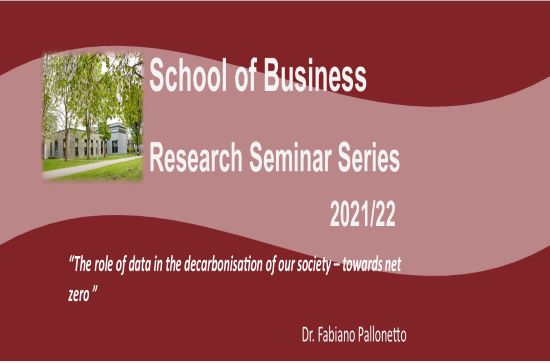
Join us for our next Research Seminar with Dr Fabiano Pallonetto, Assistant Professor School of Business Maynooth University.
Click here to join the meeting
Abstract
Electricity supply/demand balancing measures have traditionally been achieved by controlling conventional generation in response to energy demand variations. However, increasing renewable generation can lead to more significant changes on the supply side, requiring a faster balancing response from grid operators. Standard generation units may not have sufficient ramping capabilities to counter high volatility in renewable energy generation. Modern forecasting techniques and advanced control systems can mitigate such challenges and flexible demand resources and demand-side management measures. Innovations such as building home automation, diffusion of intelligent appliances and energy management system integration are necessary prerequisites to boost the power system's efficiency while increasing the renewable penetration towards an affordable and clean energy supply. Combining these measures with energy management systems equipped with advanced artificial intelligence algorithms enables electricity end-users to modulate their electricity consumption by dynamically responding to fluctuations in the power generation caused by renewable. The increased capacity of controllable load through these devices actively contributes to the higher penetration of renewable energy and the decarbonisation of our society.
About the Speaker
Dr Fabiano Pallonetto is a Lecturer in Management Information System at Maynooth University (Ireland) and member of the Energy Institute at University College Dublin. He has a wide experience in the energy, IT and transport sectors working as an entrepreneur, data scientist and researcher across different industries and disciplines. His academic background in Computer Science and Engineering and his industry experience in Energy, Sustainable Mobility, Data Analytics, Control Algorithms and Optimisation make him a pivotal asset for research based and commercial data centric projects. His goal is bridging academic research to industrial needs applying his multidisciplinary industry and entrepreneurship experience to build solutions and solve technical challenges for the deployment and integration of the smart grid and its associated carbon footprint reduction and promoting Sustainable Development Goals.
